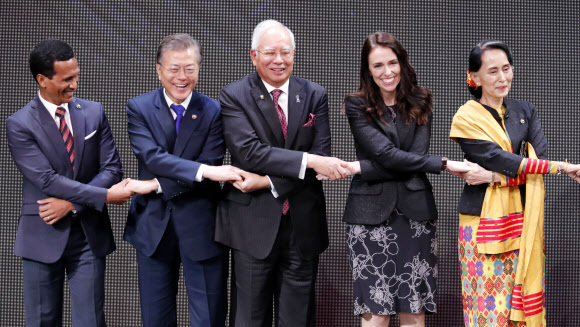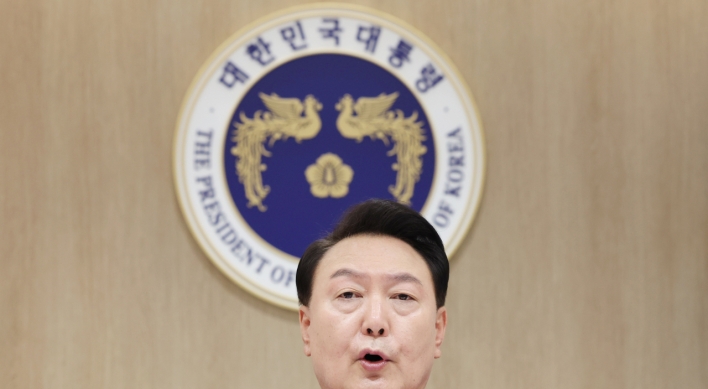[Feature] Recalibrating diplomatic portfolio with New Southern Policy
By Park Han-naPublished : May 12, 2019 - 15:19
The escalating tensions between the US and China highlight the pressing need for broadening South Korea’s diplomatic horizon further with President Moon Jae-in’s initiative that aims at deepening ties with the 10-member Association of Southeast Asian Nations.
However, the policy should address more regional issues rather than just expanding Seoul’s economic presence in the ASEAN block, experts said.
However, the policy should address more regional issues rather than just expanding Seoul’s economic presence in the ASEAN block, experts said.

In November 2017, Moon unveiled the New Southern Policy with the aim of elevating its relations with ASEAN and India to the level Seoul enjoys with four regional powers -- the US, China, Japan and Russia.
The policy, which is entering its second year of implementation, has been focusing on economic coordination to curb Seoul’s reliance on a few traditional trading partners.
However, as US-China tensions in trade and geopolitical issues exert pressure on ASEAN countries, the policy should take a strategic and diplomatic approach, Choe Won-gi, a professor at the Korea National Diplomatic Academy, said at a forum titled “Korea’s Foreign Policy Initiatives: New Southern and Northern Policy,” on May 8.
“The US-China conflict is not temporary. It stemmed from a change in the balance of power and disrupts the existing international order,” he said.
The bloc boasts strategic locations linking the Indo-Pacific region that hosts the world’s most crucial trading and energy supply routes -- a reason why the US, China and other major countries have been vying for influence over ASEAN.
Building an inclusive regional architecture that works collectively for regional prosperity, peace and stability with ASEAN will be Seoul’s next mission in blocking the world’s superpowers from bringing about divisiveness in the region.
Upgrading cooperative relations with ASEAN through expanding trade and people-to-people exchanges has started bearing fruit.
According to the Presidential Committee on New Southern Policy, trade volume between the two sides a hit record high of over $160 billion last year. Of the 45 branches of South Korean financial companies that were launched in the last five years, 43 have made inroads in ASEAN countries.
While the policy offers many opportunities, it also faces lingering challenges.
Park Eun-hong, a professor at Sungkonghoe University, warned of the possibility that the policy could be perceived by other Southeast Asian countries as a tool for Seoul’s pursuit of its own economic interests.
He cited Japan as an example. When Japan pushed an economically aggressive path with ASEAN in the 1970s, some Southeast Asian nations witnessed anti-Japanese riots, accusing the country of economic imperialism. Japan had to modify the course of its foreign policy to promote noneconomic ties with ASEAN, seeking to develop “heart-to-heart” relationships for mutual trust.
“The success or failure of the New Southern policy depends on whether or not people-centered diplomatic philosophy is actually and continuously put into action,” Park said.
Although the economic cooperation aspect of the policy has stood out so far, the New Southern Policy was crafted under the slogan of three Ps -- people-oriented exchanges, mutual peace and prosperity.
Seoul University professor Kim Hyun-chul, who served as the chair of Presidential Committee on New Southern Policy until his resignation in January, said his team had put people-to-people exchanges at the forefront.
“What ASEAN wanted most from us was personal exchanges and heart-to-heart connection. That’s also what we are good at,” Kim said.
In 2018, the number of visitors between South Korea and ASEAN surpassed 10 million for the first time, up some 10 percent on-year.
Looking ahead, experts also suggested South Korea and ASEAN exercise joint leadership in sectors such as disaster response, anti-terrorism, cybersecurity and maritime security.
Encouraging ASEAN to play a constructive role in peace and stability on the Korean Peninsula by expanding North Korea’s participation in regional multilateral mechanisms will be beneficial for South Korea, said Suh Jeong-in, the country’s former envoy to ASEAN.
“The ASEAN Regional Forum is the only multilateral security meeting that the North takes part in and we should push for such engagement,” he said.
The government is considering inviting North Korean leader Kim Jong-un to a special ASEAN summit that will be held in the southern port city of Busan on Nov. 25-26 to commemorate the 30th anniversary of the establishment of diplomatic ties between South Korea and ASEAN.
Since taking office, Moon has held summits with leaders of eight countries in the ASEAN bloc, except for Malaysia and Laos. Next year, the government plans to map out the next phase -- New Southern Policy 2.0.
By Park Han-na (hnpark@heraldcorp.com)










![[KH Explains] How should Korea adjust its trade defenses against Chinese EVs?](http://res.heraldm.com/phpwas/restmb_idxmake.php?idx=644&simg=/content/image/2024/04/15/20240415050562_0.jpg&u=20240415144419)








